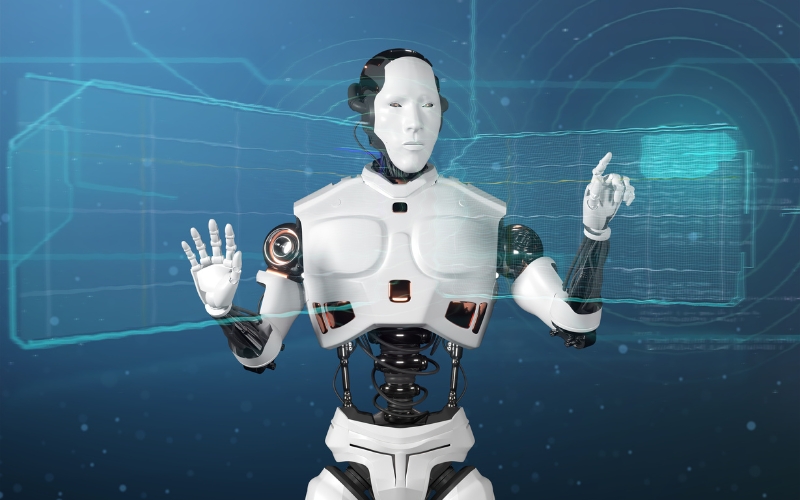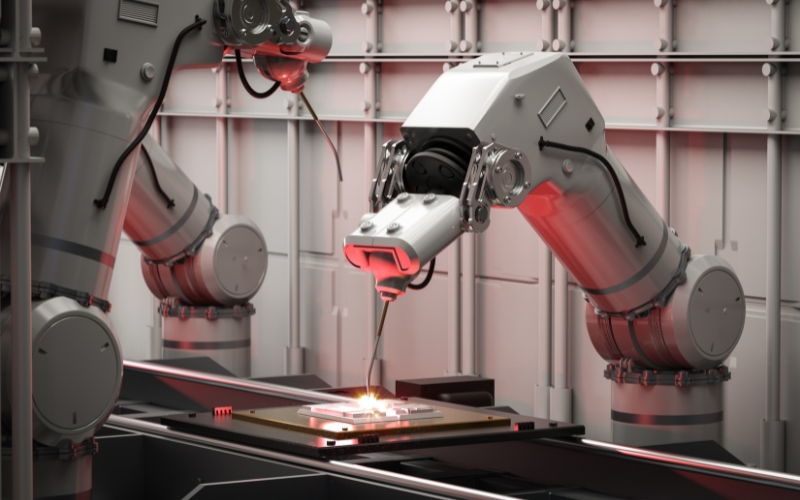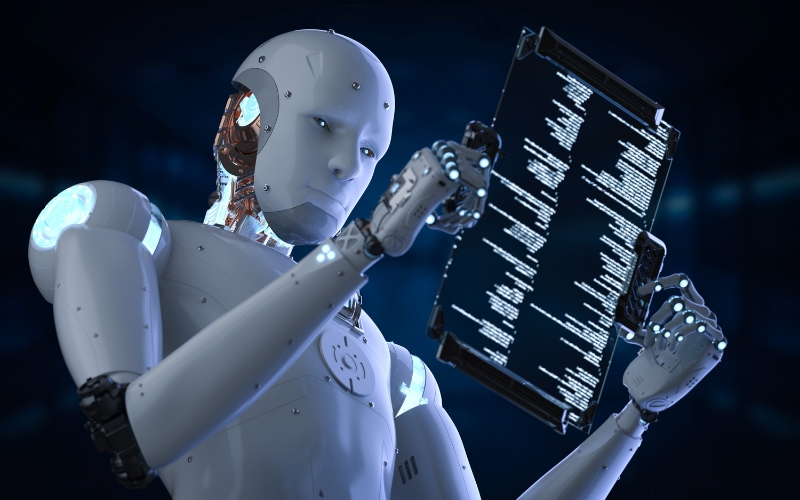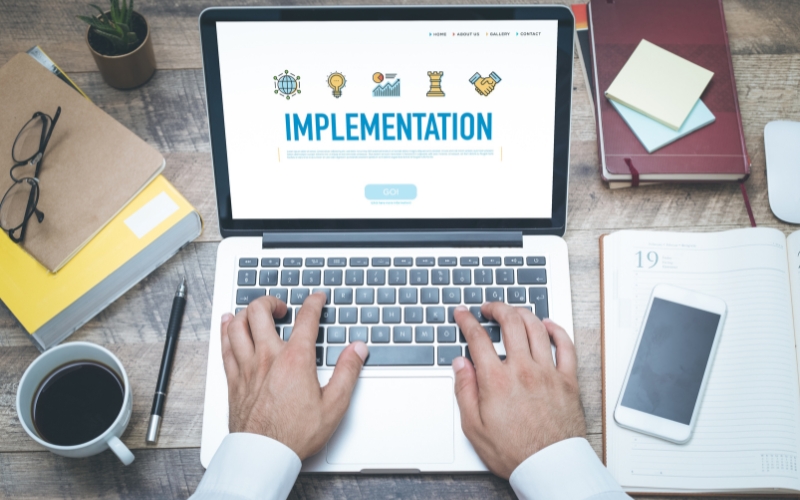- The Role Of AI and Automation in Talent Acquisition
- Automation in Candidate Sourcing
- Reducing Bias with AI in Screening
- Improving Candidate Experience with Automation
- AI-Powered Assessments for Executive Roles
- Challenges of Implementing AI and Automation in Executive Recruitment
- The Future of AI and Automation in Executive Recruitment
- Embrace AI and Automation with JRG Partners
The landscape of talent acquisition is rapidly evolving, with artificial intelligence (AI) and automation taking center stage in transforming the hiring process. For executive recruiters, understanding the implications and opportunities of AI-driven talent acquisition is essential to staying competitive in a fast-paced market. This article explores how AI and automation are shaping the future of recruitment and what executive recruiters need to know to leverage these technologies effectively.
The Role Of AI and Automation in Talent Acquisition

Artificial intelligence (AI) is revolutionizing how talent is sourced, evaluated, and matched with roles, reshaping the future of hiring. AI algorithms analyze vast amounts of data in real-time, enhancing the speed and accuracy of the recruitment process while minimizing human biases. AI and automation in talent acquisition allow executive recruiters to automate many repetitive and time-consuming tasks, such as screening resumes, identifying top candidates, and scheduling interviews. These advancements enable recruiters to operate more efficiently and strategically.
Enhanced Candidate Screening and Selection
With AI and automation in talent acquisition, recruiters can process thousands of resumes in a fraction of the time. Traditional methods often involve manually reviewing applications, which can result in human error or unconscious bias. However, AI algorithms can identify relevant keywords, skills, and qualifications, ensuring that only the most suitable candidates move forward. This automated screening process improves both the accuracy and fairness of recruitment, ensuring no talent goes unnoticed. AI-driven platforms can also predict candidate success by analyzing past job performance, educational backgrounds, and even cultural fit within a company.
Automating Communication Through Chatbots
One of the most impactful applications of AI and automation in talent acquisition is the use of AI-powered chatbots. These chatbots can handle initial candidate inquiries, conduct preliminary interviews, and provide instant feedback to applicants. By automating these interactions, recruiters can engage with more candidates without increasing workload. Additionally, chatbots ensure a seamless candidate experience by providing real-time updates and answering common questions about the application process, fostering engagement from the outset.
Time Savings and Improved Efficiency
Recruiters often spend a significant portion of their time on administrative tasks, such as scheduling interviews, following up with candidates, and compiling candidate reports. AI and automation in talent acquisition relieve recruiters from these burdens by automating scheduling and candidate management. Calendar integrations can automatically book interview slots based on availability, while candidate tracking systems ensure that follow-ups are timely and organized. With administrative tasks minimized, recruiters have more time to focus on relationship-building and high-value advisory services.
Data-Driven Decision Making
AI-powered recruitment tools generate detailed analytics, offering valuable insights into recruitment performance and candidate behavior. Through AI and automation in talent acquisition, recruiters can monitor key metrics such as time-to-fill, cost-per-hire, and candidate engagement levels. These insights allow companies to refine their strategies continuously, ensuring that recruitment efforts align with business goals. Predictive analytics can even forecast talent needs, helping organizations proactively source candidates before positions become vacant.
Personalization and Candidate Experience
Another benefit of AI and automation in talent acquisition is the ability to personalize candidate interactions. AI tools analyze candidate data to create tailored communication, such as personalized job recommendations and follow-up emails. Candidates appreciate personalized interactions, which can enhance their experience and increase the likelihood of accepting job offers. Furthermore, automation ensures that every applicant receives timely feedback, creating a positive brand impression for the hiring company.
Strategic Focus and Long-Term Value
By integrating AI and automation in talent acquisition, recruiters can shift their focus from manual processes to more strategic tasks. Rather than spending hours screening resumes, recruiters can engage with high-potential candidates, provide strategic hiring advice to clients, and contribute to long-term talent planning. This shift improves the quality of hire and elevates the role of recruiters, positioning them as trusted advisors rather than merely facilitators of the hiring process.
Automation in Candidate Sourcing

One of the key challenges in executive recruitment is finding qualified candidates quickly. In the fast-paced environment of modern business, the ability to swiftly identify and engage top-tier talent can make or break an organization’s success. This is where AI and Automation in Talent Acquisition are making a transformative impact. Automation tools are becoming essential for sourcing passive candidates from various platforms, such as LinkedIn, job boards, and professional networks. These tools streamline the recruitment process by scanning profiles and resumes, searching for candidates who meet specific criteria, and compiling them into a list for the recruiter to review.
The traditional process of manually sifting through hundreds of profiles is time-consuming and prone to human error. By integrating AI and Automation in Talent Acquisition, executive recruiters can bypass these challenges. Automated systems can evaluate vast pools of potential candidates in a fraction of the time it would take a human recruiter. This efficiency is not only valuable for reducing time-to-hire but also for ensuring recruiters do not overlook hidden talent.
Predictive Analytics for Better Candidate Identification
A key feature of AI and Automation in Talent Acquisition is the use of predictive analytics to enhance candidate identification. AI-powered tools use algorithms to identify potential candidates based on keyword matches, past job performance, and even online activity. These tools can analyze social media behavior, engagement patterns, and other digital footprints to predict the likelihood of a candidate being open to new opportunities. This predictive ability enables recruiters to direct their outreach efforts toward candidates who are most likely to respond positively.
Additionally, automation tools can assess candidate profiles beyond basic qualifications. For instance, some AI systems evaluate soft skills, cultural fit, and career trajectory, providing deeper insights into whether a candidate aligns with the company’s goals. This advanced level of screening helps recruiters focus on candidates who are not just qualified but are also the best fit for executive roles.
Enhancing Candidate Engagement with AI-Powered Outreach
Another advantage of AI and Automation in Talent Acquisition is the ability to enhance candidate engagement. Automated outreach tools allow recruiters to send personalized messages to candidates at scale. These systems can tailor communications based on a candidate’s interests, industry, and career goals, making the outreach more relevant and engaging.
Moreover, chatbots powered by artificial intelligence can be employed to maintain communication with candidates throughout the recruitment process. These chatbots answer frequently asked questions, schedule interviews, and provide real-time updates to candidates. This level of interaction improves the candidate experience and ensures no promising candidate is lost due to communication delays or neglect.
Efficiency Gains in Executive Search
Executive recruiters who leverage AI and Automation in Talent Acquisition can dramatically increase their efficiency in finding top candidates. Traditional recruitment often involves multiple rounds of manual screening and interviewing, which can be labor-intensive. Automation tools simplify this process by automating repetitive tasks, such as initial resume screening and candidate assessments.
AI-driven platforms can also create talent pipelines by identifying potential candidates who may not be a fit for current roles but could be ideal for future positions. By continuously updating these pipelines with new talent, recruiters can respond quickly to client needs with pre-qualified candidates, ensuring they stay ahead of the competition.
Furthermore, automation allows recruiters to focus on more strategic activities, such as building relationships with candidates and clients. With the administrative burden reduced, recruiters can spend more time understanding the specific needs of their clients and tailoring their search strategies accordingly.
Data-Driven Decision-Making
The role of AI and Automation in Talent Acquisition extends beyond candidate sourcing and engagement. These technologies provide recruiters with access to data-driven insights that inform decision-making throughout the hiring process. By analyzing recruitment metrics—such as time-to-hire, cost-per-hire, and candidate response rates—AI tools help recruiters optimize their strategies and improve outcomes.
Additionally, AI can identify patterns in recruitment data, such as the types of candidates who perform well in certain industries or the most effective communication methods for specific talent pools. These insights enable recruiters to refine their approach and achieve better alignment between candidate profiles and client expectations.
Overcoming Bias in Recruitment
AI-powered recruitment tools also contribute to creating a more inclusive hiring process. One of the persistent challenges in recruitment is unconscious bias, which can affect decisions during resume screening and interviewing. AI and Automation in Talent Acquisition help mitigate bias by focusing solely on objective criteria, such as skills, experience, and qualifications.
Some AI tools even use anonymized candidate profiles during the initial screening stages to ensure a fair evaluation. By removing identifying information, such as names and photos, these tools help recruiters assess candidates purely based on merit. This approach fosters diversity and inclusion, which are essential for building high-performing executive teams.
Continuous Learning and Adaptation
A unique aspect of AI and Automation in Talent Acquisition is the ability of these systems to learn and adapt over time. Through machine learning, AI algorithms become more accurate as they process more data. For example, an AI system used in recruitment might initially focus on specific keywords or qualifications, but over time, it learns to recognize patterns associated with successful candidates that were not immediately obvious.
This continuous learning enables recruiters to fine-tune their search criteria and discover high-potential candidates who might have been overlooked using traditional methods. As these systems evolve, they become invaluable assets in the pursuit of top executive talent.
Reducing Bias with AI in Screening

Bias in the recruitment process has long been a challenge, especially in executive-level hiring, where the stakes are higher, and decisions significantly impact organizational outcomes. Traditional hiring methods often rely on human judgment, which, while valuable, can introduce unconscious bias. This is where AI and Automation in Talent Acquisition can provide transformative solutions by creating more objective, data-driven processes for identifying talent.
One of the most prominent advantages of AI and Automation in Talent Acquisition is the potential to reduce human bias during the initial screening phase. AI systems can analyze resumes and candidate profiles based purely on qualifications, skillsets, and relevant experience. These tools use structured data to evaluate applicants, bypassing subjective factors such as gender, ethnicity, or educational background. This impartial assessment enables organizations to create a fairer hiring process, improving their ability to identify high-quality candidates who may have been overlooked due to unconscious bias.
For executive recruiters, AI-powered tools open the door to broader and more diverse talent pools. Traditional recruitment processes often limit candidate selection to those from familiar networks or similar industries, potentially excluding individuals with non-traditional career paths or diverse experiences. However, AI and Automation in Talent Acquisition enable recruiters to uncover hidden talent by analyzing candidates across various sources and backgrounds. This helps ensure a more inclusive hiring process, resulting in stronger, more innovative leadership teams.
At the same time, it’s essential for organizations to recognize that AI and Automation in Talent Acquisition are not without their challenges. AI tools must be trained on unbiased datasets to avoid perpetuating existing biases. If historical hiring data used to train these algorithms contains biases—whether intentional or unintentional—AI systems may reinforce those patterns, leading to unfair outcomes. For example, if a company’s historical data reflects a preference for candidates from a particular demographic, the algorithm may unintentionally favor similar profiles, contradicting the goal of eliminating bias.
Therefore, recruiters must actively monitor and audit AI tools to ensure their outputs align with diversity and inclusion goals. This means continuously evaluating the data used to train algorithms and adjusting processes as needed. Transparent communication with AI providers and cross-functional collaboration with data experts are critical steps to optimize the effectiveness of AI and Automation in Talent Acquisition. Recruiters should treat these tools as valuable assistants rather than complete replacements for human judgment, ensuring that ethical considerations are embedded throughout the hiring process.
AI and Automation in Talent Acquisition provide powerful opportunities to reduce bias and promote diversity in hiring. By leveraging these technologies thoughtfully, recruiters can build inclusive teams that reflect a wide range of perspectives, ultimately driving innovation and business success. However, responsible use requires ongoing oversight to ensure these systems align with fairness and equity objectives. When implemented correctly, AI and Automation in Talent Acquisition have the potential to transform the recruitment landscape, allowing organizations to attract the best talent while maintaining an ethical and unbiased approach to hiring.
Improving Candidate Experience with Automation

In today’s competitive job market, AI and Automation in Talent Acquisition play a crucial role in enhancing candidate experience, making it easier to attract and retain top talent. AI and automation tools streamline the candidate journey by offering faster, more responsive interactions. For example, AI-powered chatbots, a key part of AI and Automation in Talent Acquisition, can answer candidates’ questions in real-time, schedule interviews, and provide updates on their application status.
For executive candidates, who expect a high level of professionalism and personalization, AI and Automation in Talent Acquisition enable a seamless experience that reflects well on the recruiting firm. Automated communication ensures timely feedback, minimizing the frustration caused by long wait times. This blend of technology makes talent acquisition more efficient, while recruiters can focus on building stronger relationships with candidates.
While automation enhances communication efficiency, recruiters must balance technology with human interaction. Particularly in executive roles, a personal touch through phone calls or face-to-face meetings should complement AI-driven processes. AI and Automation in Talent Acquisition offer a powerful advantage, but maintaining a human element ensures trust and rapport with candidates, setting the foundation for successful hiring decisions.
AI-Powered Assessments for Executive Roles

Evaluating the leadership qualities and potential of executive candidates goes beyond reviewing their resumes and conducting interviews. AI tools can provide deeper insights into a candidate’s fit for an executive role by assessing their personality, cognitive abilities, and leadership potential through data-driven assessments.
AI-powered assessments can include psychometric tests, behavioral assessments, and even AI-driven video interviews that analyze body language, tone of voice, and speech patterns. These tools allow executive recruiters to evaluate a candidate’s soft skills—such as decision-making ability, emotional intelligence, and cultural fit—more objectively than traditional methods.
By integrating AI-powered assessments into the executive hiring process, recruiters can ensure they’re selecting candidates who not only have the right qualifications but also the leadership traits needed to excel in a C-suite role.
Challenges of Implementing AI and Automation in Executive Recruitment

While AI and Automation in Talent Acquisition offer significant benefits, they also present challenges, particularly in the context of executive recruitment. One key concern is the potential over-reliance on these tools, which could lead to a loss of the personal touch that’s crucial in recruiting top-level executives. Executive roles require relationship-building and a nuanced understanding of a candidate’s motivations and values—elements that AI and Automation in Talent Acquisition cannot fully replicate.
Another challenge is data privacy and compliance. With the integration of AI and Automation in Talent Acquisition, recruiters must ensure they’re handling candidate data responsibly, adhering to regulations like the General Data Protection Regulation (GDPR) and other privacy laws. Proper data management practices and transparency in how these systems use candidate information are essential for maintaining trust with both clients and candidates.
Recruiters must also stay updated on technological advancements and invest in training to understand how to integrate these tools effectively. While these technologies can streamline processes, human oversight is necessary to ensure the tools are used ethically and aligned with recruitment best practices.
The Future of AI and Automation in Executive Recruitment

AI and automation will continue to evolve, with even more sophisticated tools expected to emerge in the coming years. For executive recruiters, staying ahead of the curve means continuously exploring new technologies and adapting their recruitment strategies to incorporate AI-driven solutions effectively.
In the future, AI may enable even more precise candidate matching by analyzing data from a broader range of sources, such as social media, industry publications, and even personal networks. Automation may also advance to the point where entire stages of the recruitment process, from initial outreach to final interviews, are fully automated—though human interaction will remain essential for building relationships at the executive level.
Executive recruiters who embrace AI and automation as part of their talent acquisition strategy will be better positioned to find and engage top-tier candidates in an increasingly competitive market.
Embrace AI and Automation with JRG Partners
Are you ready to leverage AI and automation in your talent acquisition strategy? At JRG Partners, we specialize in combining cutting-edge technology with personalized executive search services to help you find the visionary leaders your organization needs. Contact us today to learn how we can help you optimize your executive recruitment process using AI and automation.


